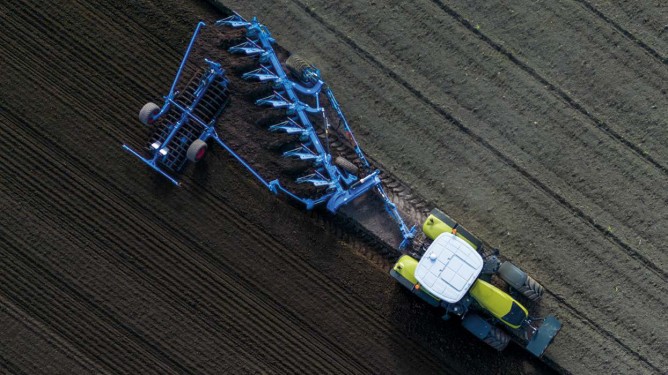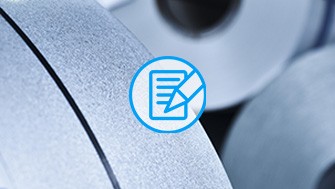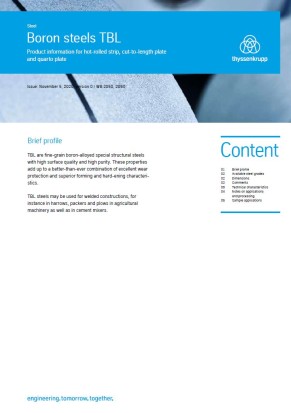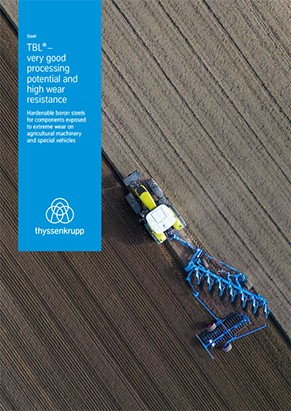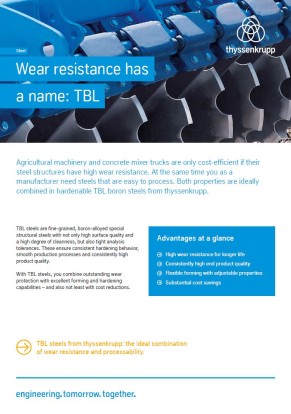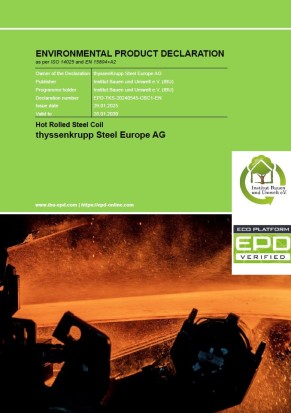A special steel grade for the agricultural and forestry industry

Agricultural machines are expensive and should therefore be hard wearing, as they are subject to extreme wear. The steel used for the construction of those machines needs to be especially wear-resistant. Moreover, the steel should be easy to process, allowing manufacturers to form, weld, and thermal cut the material in all commonly used methods.
The hardenable TBL® boron steels made by thyssenkrupp provide the material solution meeting all these needs for high-wear components in the agricultural industry. TBL® combines an especially high final hardness level achieved after processing, and high ductility. Owing to these characteristics, TBL® has long been used for the construction of agricultural and forestry vehicle components. TBL® steel features a high purity degree and close-analysis tolerances, thus ensuring consistent behavior in the quenching and hardening process.
New: The portfolio of our hardenable boron steels with very good processing properties and high wear resistance has been expanded. The new grade TBL® 45 with a hardness of 51 to 57 HRC after quenching and tempering is used where long service lives under high wear stress are required: agricultural wear parts for soil cultivation and harvesting technology.
Boron steels TBL® according to DIN EN ISO 683-2 (previously DIN EN 10083-3)
| Steel grade | |
Reference grade |
Hot-rolled strip / cut-to-length plates | |
|---|---|---|---|
| THICKNESS1 from _ to in mm |
WIDTH1 from _ to in mm |
||
| TBL® 30 | Special mill grade | 2.50 – 18.00 | 1,000 – 2,030 |
| TBL® 35 | Special mill grade | 2.50 – 15.00 | 1,000 – 1,630 |
| TBL® 40 | Special mill grade | 2.50 – 12.00 | 1,000 – 1,630 |
| TBL® 45 | Special mill grade | 2.50 – 12.00 | 1,000 – 1,630 |
| TBL® 50 | Special mill grade | 3.00 – 12.00 | 1,000 – 1,630 |
Chemical composition (Mass fractions in ladle analysis)
| Steel grade | C [%] |
Si [%] | Mn [%] |
P [%] | S [%] | Al [%] | Cr [%] | Ni [%] | Ti [%] | B [ppm] | Typ. CEV | Typ. CET |
|---|---|---|---|---|---|---|---|---|---|---|---|---|
| TBL® 30 | 0.25 – 0.35 | ≤ 0.40 | 1.00 -1.50 | ≤ 0.025 | ≤ 0.010 | 0.02 – 0.06 | ≤ 0.50 | - | 0.02 – 0.05 | 10 – 50 | 0.55 | 0.40 |
| TBL® 35 | 0.30 – 0.40 | ≤ 0.40 | 1.00 -1.50 | ≤ 0.025 | ≤ 0.010 | 0.02 – 0.06 | ≤ 0.50 | - | 0.02 – 0.05 | 10 – 50 | 0.60 | 0.50 |
| TBL® 40 | 0.35 – 0.45 | ≤ 0.40 | 1.00 -1.50 | ≤ 0.025 | ≤ 0.010 | 0.02 – 0.06 | ≤ 0.50 | - | 0.02 – 0.05 | 10 – 50 | 0.70 | 0.55 |
| TBL® 45 | 0.40 – 0.50 | ≤ 0.40 | 1.00 -1.50 | ≤ 0.025 | ≤ 0.010 | 0.05 – 0.15 | ≤ 0.50 | - | 0.005 – 0.020 | 10 – 50 | 0.75 | 0.60 |
| TBL® 50 | 0.45 – 0.55 | ≤ 0.40 | 1.00 -1.50 | ≤ 0.025 | ≤ 0.010 | 0.02 – 0.06 | ≤ 0.70 | 0.10 – 0.30 | 0.02 – 0.05 | 10 – 50 | 0.80 | 0.65 |
Mechanical properties, typical values in delivery condition at room temperature
| Steel grade |
Thickness [mm] |
Yield strength Re [MPa] |
Tensile strength Rm [MPa] |
Elongation A5 [%] |
Hardness in delivery condition [HBW] |
|---|---|---|---|---|---|
| TBL® 301 | ≥ 3 – 12 | 400 | 620 | 22 | 180 |
| TBL® 351 | ≥ 3 – 12 | 430 | 680 | 22 | 200 |
| TBL® 401 | ≥ 3 – 12 | 470 | 750 | 20 | 220 |
| TBL® 451 | ≥ 3 – 12 | 510 | 825 | 17 | 240 |
| TBL® 501 | ≥ 3 – 12 | 620 | 880 | 17 | 260 |
TBL®-Boron steels with impressive final hardness
During the quenching and tempering process, the combination of carbon, manganese and the smaller boron content ensures that the TBL® steels can be hardened easily in different media. The maximum attainable hardness depends on the type of process applied and is about 660 HBW (62 HRC). The subsequent tempering, i.e. renewed heating of the component, reduces the stresses in the material caused in the hardening process.
Application examples of boron alloyed quenched and tempered steels

Hardened TBL® steel is especially well suited for the construction of wear-resistant welded parts with complex geometries. Exemplary use cases within the agricultural sector are the shares and waves of ploughs. Due to its very high durability, this steel grade also lends itself well for the construction of coupling elements and chains of construction vehicles. Even unhardened, TBL® is suitable for applications subject to moderate wear, such as cement mixers.
A current example is agricultural machinery manufacturer Lemken. The latter has extensively tested the new TBL® 45 grade – and found it to be excellent. The overall package of various advantages of the steel ultimately led to the decision to use TBL® 45 from thyssenkrupp Steel in Lemken plows in the future. A well-considered decision, in the run-up to which both project partners invested a lot of time and effort for interdisciplinary cooperation. More on the Lemken practical example is available for download.
Excellent processing properties
Our TBL® steels offer a wide range of processing possibilities. TBL® can be hot formed, but also be cold formed and used unhardened. This is an option for concrete mixers, which are subject to minor abrasive wear. Even unhardened, boron steel offers good wear properties owing to its fine-grained microstructure.
The fine-grained microstructure is obtained by settings made during the rolling process: In the as-delivered condition, the steel contains ferrite and perlite, i.e. both hard and soft microstructure elements. After the hardening the microstructure displays a 100% martensite content, which is an indicator of an extremely strong material. That is why we recommend a combination of hot forming between 900 and 1050 °C, followed by quenching and tempering, where intricate geometries are concerned and high demands are to be met.
TBL® steel has excellent processing properties, both in cold and in hot forming. It can be welded or cut in all commonly used processes, both automatic and manual. In order to avoid cold cracks, the steel should be preheated. Our Technical Customer Service is available to answer any questions you may have regarding the processing of TBL® steels. We will be just as happy to advise you on all joining and forming technology issues.
Typical values for heat treatment
| Steel grade |
Normalizing |
Hardening | |
|---|---|---|---|
| Austenitizing Duration ≥ 15 min. |
Subsequent tempering Duration ≥ 30 min. |
||
| TBL® 30 | 860 – 880 °C | 860 – 880 °C | 150 – 350 °C1 |
| TBL® 35 | 840 – 860 °C | 840 – 860 °C | 150 – 350 °C1 |
| TBL® 40 | 835 – 855 °C | 835 – 855 °C | 150 – 350 °C |
| TBL® 45 | 820 – 840 °C | 820 – 840 °C | 150 – 350 °C |
| TBL® 50 | 810 – 830 °C | 810 – 830 °C | 150 – 350 °C |
